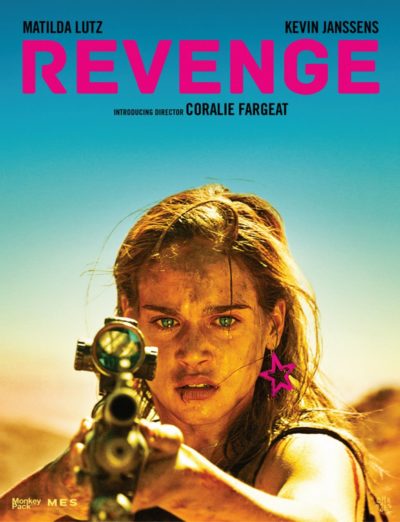★★★★½
“Women always have to put up a fucking fight.”

 This French rape-revenge movie is the most blood-drenched GWG film I’ve seen since Kill Bill, Volume 1, and is not for the faint of heart. However, the good news is, it’s not the rape part of the equation which is hard to watch: this is depicted with admirable restraint, occurring mostly off-camera. The director has stressed that the story isn’t about the rape, and I’m delighted with that: it has always struck me as the least interesting element. It’s a plot device, to kick-off what matters. Focusing on it, as some films have done, seems to me like focusing on turning the ignition key, instead of driving the car. This, instead, offers a road-trip to remember.
This French rape-revenge movie is the most blood-drenched GWG film I’ve seen since Kill Bill, Volume 1, and is not for the faint of heart. However, the good news is, it’s not the rape part of the equation which is hard to watch: this is depicted with admirable restraint, occurring mostly off-camera. The director has stressed that the story isn’t about the rape, and I’m delighted with that: it has always struck me as the least interesting element. It’s a plot device, to kick-off what matters. Focusing on it, as some films have done, seems to me like focusing on turning the ignition key, instead of driving the car. This, instead, offers a road-trip to remember.
The victim is Jen (Lutz), a young girl having a weekend in the Moroccan desert with her rich, married boyfriend, Richard (Janssens). He’s also there to do a spot of hunting with his pals, Stan and Dimitri (Colombe and Bouchède). They four have a night drinking and dancing, but the next morning, when Richard heads off to make travel arrangements, Stan rapes Jen. On Richard’s return, he tries to smooth things over. Jen is having none of it, and storms off. Knowing that any legal complaint would destroy his marriage, Richard fakes calling for transport out, then pushes Jen off a cliff. Her landing is… not a soft one. Convinced the problem is solved, the men leave disposing of the body until later. Except, Jen isn’t dead, and when the trio go back, she’s not there. Helped by some impressively strong peyote – in this case, the drugs clearly do work – she patches herself up, and turns the hunters into the hunted.
First, let me address the improbably-resilient elephant in the room. Yes, her survival and pursuit is implausible, with a couple of large holes. Literally: one of the film’s two highly cringe-inducing pieces of self-surgery shows Jen patching up a hole in her stomach. Yet there must, of necessity, be an even larger one in her back. What happened to that? To be honest, they didn’t need this aspect at all: simply surviving the fall would have been hardcore enough. She also goes barefoot through the entire film, without a whimper. In the Arizona summer, I can’t take the garbage out barefoot without leaving singed skin on the drive. One shot of her pulling the shoes off her first victim would have fixed that.
It’s a shame, albeit a minor one, because virtually everything else is perfect. The transition of Jen, from the stuff of Richard’s fantasies, to that of his nightmares – he’s the one who delivers the tagline above – is impeccably handled. Even her good looks transform. At the beginning, it’s a shallow and utterly conventional prettiness – which she has exploited into a weekend getaway to a luxury location. By the end, she has paid a terrible price for this. Yet even as she’s missing minor body parts, disfigured, drenched in blood (both hers and others) and covered in desert grime… she’s glowing. Her inner beauty shines through, increasingly illuminating the bad-ass bitch she has become over the course of proceedings.
 For a film lauded for its supposed up-ending of the male gaze, this feels a bit odd, since it could be read as the sexual assault triggering Jen’s blossoming: rape as psychological therapy. She should thank her attackers! [The image of a rising phoenix branded into her skin, due to her impromptu first-aid, is not exactly subtle in its imagery. Then again, the entire film is not exactly subtle, and proudly defiant as such] If that reading is on shaky ground, it’s also amusing to note Revenge utterly fails the dreaded Bechdel Test, despite being brutally empowering, to a degree rarely seen. More evidence – as if it were really needed – of how shitty the Bechdel Test is at evaluating films.
For a film lauded for its supposed up-ending of the male gaze, this feels a bit odd, since it could be read as the sexual assault triggering Jen’s blossoming: rape as psychological therapy. She should thank her attackers! [The image of a rising phoenix branded into her skin, due to her impromptu first-aid, is not exactly subtle in its imagery. Then again, the entire film is not exactly subtle, and proudly defiant as such] If that reading is on shaky ground, it’s also amusing to note Revenge utterly fails the dreaded Bechdel Test, despite being brutally empowering, to a degree rarely seen. More evidence – as if it were really needed – of how shitty the Bechdel Test is at evaluating films.
The good thing is that the feature’s entertainment value in no way relies on any kind of Identity Politics 1.0.1. to work. It functions perfectly well as a stripped-down pursuit, which neither asks for, no offers, any kind of quarter on behalf of the participants – for their genders or any other reason. There’s a steady, relentless escalation to proceedings from the moment Jen takes flight, to a final confrontation which redefines “paint the walls blood-red”. That’s a jaw-dropping pursuit round the house where things began, and includes proof that cling film, like duct tape, has a thousand and one uses.
The director says the only previous example of the rape-revenge genre she watched was Wes Craven’s Last House on the Left. Though if true, the proximity of names for the heroine here and in the genre’s most infamous entry, I Spit On Your Grave, is a striking coincidence. That aside, it’s interesting to note that the only other female-directed entry, Baise-moi, was also from France. And in tone, this has almost as much in common with À l’interieur (Inside), which was just as blood-drenched, and similarly gave absolutely no fucks. Much credit to Fargeat for this “take no prisoners” attitude, and delivering a thoroughly uncompromising piece of cinema; kudos for all of her cast as well, in particular Lutz, who go all-in to no less a degree.
I’ve been watching extreme films for thirty years or so, and let’s be honest, you get a bit desensitized to it all. We went to see this one at a local art cinema, and from their reactions, it was clear that most of the audience were, let’s say, not as “experienced” in the ways of savage cinema as Chris and I. Their responses merely added to the fun: I’d kinda forgotten how audience reaction can enhance a film (their goddamn rustling of snacks… not so much, but let’s move rapidly on). At the end, after all was said and done, one of the other attendees blurted out loud, “Best ten bucks I’ve ever spent.” I’m not inclined to disagree. Despite its flaws – which I acknowledge and embrace – if 2018 offers a film which packs a bigger punch, I can’t wait to see it.
Dir: Coralie Fargeat
Star: Matilda Lutz, Kevin Janssens, Vincent Colombe, Guillaume Bouchède




